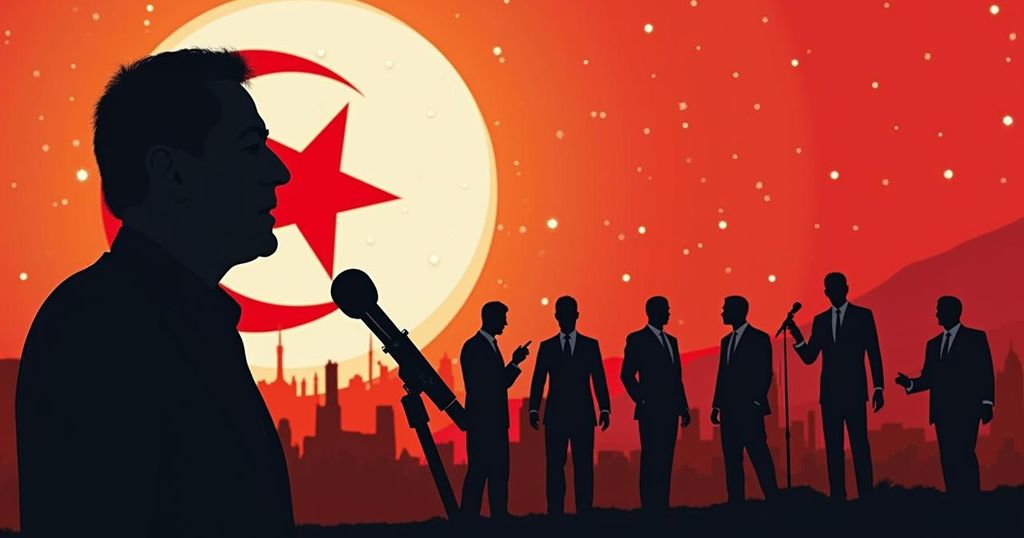Overview of the Presidential Election Landscape in Tunisia: Candidates, Challenges, and the Implications for Democracy

In the upcoming October 6 presidential election in Tunisia, only two candidates, Ayachi Zammel and Zouhair Magzhaoui, have qualified to contest against incumbent President Kais Saied. Zammel faces imprisonment and charges perceived as politically motivated, while Magzhaoui is viewed as a supporter of Saied. Critics argue that the election system is rigged, stifling opposition and undermining democracy amidst growing public discontent and protests against civil liberties violations.
As Tunisia prepares for its presidential election on October 6, the political landscape is tense, marked by widespread allegations of an electoral system favoring the incumbent, President Kais Saied. Only two candidates have been authorized to run: the left-wing nationalist Zouhair Magzhaoui, perceived as a figure supportive of Saied, and Ayachi Zammel, the imprisoned leader of the liberal Azimoun party. The election, according to critics, poses a significant threat to the country’s democratic integrity. Zammel, recently sentenced to a total of 32 months in prison for allegedly falsifying candidacy documentation, has been critical of the government, stating that the charges against him are fabricated and politically driven. Meanwhile, the Independent High Authority for Elections (ISIE) has excluded most of the remaining candidates, restricting the election to a mere three names: Saied, Zammel, and Magzhaoui. In the lead-up to the elections, the ISIE’s actions have been contested, with a number of opposition figures finding legal recourse in the Administrative Court, which is considered one of Tunisia’s only remaining independent judicial bodies. Yet, despite the court’s rulings in favor of some candidates, the ISIE maintained its original list. The electoral context has been further complicated by the passage of legislation that strips the Administrative Court of its authority over electoral matters, thereby exacerbating the public’s discontent, leading to protests and demands for genuine democratic processes. Citizens are increasingly wary of government repression, particularly regarding the curtailing of freedoms of expression, exemplified by the implementation of Decree 54, which penalizes online speech deemed misleading. This political disillusionment is underscored by low voter turnout in past elections, indicating a populace that feels disenchanted with traditional politics. Amidst the backdrop of a highly controlled media environment, President Saied appears poised to secure an overwhelming re-election. The candidates themselves present a diverse array of political backgrounds. President Kais Saied, an independent, rose to prominence in 2019 amidst calls for systemic reform but has since consolidated his power through a series of controversial legal and political maneuvers. Ayachi Zammel, despite his incarceration, has maintained a political presence rooted in a center-liberal ideology, having previously aligned with varied political factions. Zouhair Magzhaoui represents the Echaab Movement and has been an active supporter of Saied, advocating for his reforms and critiquing the previous political elite.
The upcoming presidential election in Tunisia is a pivotal moment for the country, which has been grappling with severe political turmoil and democratic backsliding since President Kais Saied’s power consolidation in July 2021. Following his assumption of control, many opposition figures have been jailed, and a significant number of potential candidates have been barred from running, leading to accusations of a rigged election system. The current situation has drawn public protests, highlighting citizens’ demands for free and fair elections and reiterating concerns over civil liberties. The election is marked by an irrefutable lack of political competition, with only three candidates left standing, two of whom face severe restrictions, raising substantial doubts about the legitimacy of the electoral process.
In conclusion, the upcoming presidential election in Tunisia reflects an urgent need for restoration of democratic principles and civil liberties, as President Kais Saied’s administration continues to crack down on political opposition. With only three candidates left, and serious concerns regarding the integrity of the electoral process and the legitimacy of the Independent High Authority for Elections, the election is poised to reaffirm Saied’s hold on power rather than present a genuine democratic choice for the Tunisian people. The upcoming vote symbolizes not only a political contest but the broader struggle for democracy in Tunisia, revealing deep societal divisions and the critical urgency for reform.
Original Source: www.aljazeera.com







